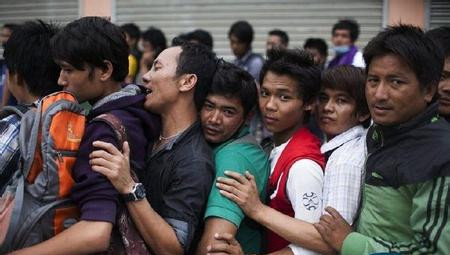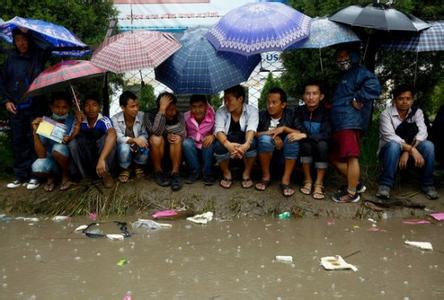尼泊尔打工者用生命换取富裕生活

尼泊尔打工者用生命换取富裕生活
KATMANDU, Nepal — Picking up coffins at Tribhuvan International Airport here was once part-time work. Only a few arrived each week, not enough for a hearse driver to make a decent living.
尼泊尔加德满都——从前,在这里的特里布万国际机场(Tribhuvan International Airport)运送灵柩只是一份兼职工作。一个星期也没几单活,不足以让一位灵车司机过上体面的生活。
Now, at least five turn up daily, the bodies shoehorned into white plastic-wrapped boxes. So, in 2009, Dipendra Prasad Acharya quit his job driving trucks to work full time in one of Nepal’s few growing industries — transporting the bodies of emigrant workers.
现在,每天至少有五副灵柩被送到这里——尸体都被塞在包裹着塑料膜的白色箱子里。于是,迪彭德拉·普拉萨德·阿查里雅(Dipendra Prasad Acharya)在2009年辞去开卡车的工作,开始全职运送出国务工者的尸体——在尼泊尔,这是为数不多的保持着增长势头的行业。
Mr. Acharya knows that his job is assured. At each pickup, he navigates around hordes of rangy young Nepali men and a growing number of women who mob the second-class departure terminal — some of whom are bound to return shrink-wrapped.
阿查里雅明白,他的工作是有保障的。每当运送尸体时,他都要绕开大群身形消瘦的尼泊尔年轻男人,以及越来越多的女人。这些人蜂拥着进入二等出港候机厅,但总有一部分会裹着塑料膜重返故土。
“The number of dead bodies keeps increasing,” he said, waiting for another coffin. “We ferry the dead to their home villages free of cost. The government pays me for my work.”
“尸体一直在增多,”他在等待另一副灵柩时表示。“我们免费把死者运回他们的家乡,政府会付给我们报酬。”
Nepal is a political and economic mess. A 10-year Maoist insurgency ended in 2006, but political leaders have since been unable to agree on a constitution. Despite vast hydropower potential, electricity is in such short supply that lights are extinguished for up to 14 hours each day. Manufacturing has declined for years, and now represents a paltry 6 percent of the country’s economy. Poverty is endemic, air pollution is choking, and health statistics are terrible.
尼泊尔的政治和经济都是一团糟。一场持续了10年的毛派叛乱已于2006年结束,但该国政治领导人至今未能就制宪事宜达成一致。这里蕴藏着巨大的水电潜能,电力供应却极端短缺,每天最多只能供电14个小时。制造业连续衰落多年,目前在国民经济中所占的比重只有区区6%。贫穷是当地的通病,空气污染令人窒息,卫生数据也很糟糕。
With few jobs at home, the country’s youths have responded by leaving. The scale of emigration has astonished development economists, yet it continues to grow, increasing 37 percent in just the past two years.
由于在家乡几乎找不到工作,尼泊尔的年轻人纷纷选择离开故土。移民潮的规模大到让发展经济学家感到吃惊,而且还在继续增长——仅仅在过去两年间就增加了37%。
On average, about 1,500 Nepalis officially left for jobs abroad each day in the 2014 fiscal year, up from six in 1996. Even more are thought to have left unofficially for India, though because the border is unchecked no one knows the precise figure. In some seasons, one-quarter of the country’s population may be working beyond the border, economists and manpower officials estimate.
在2014财年,为了到国外找工作,平均每天有1500名尼泊尔人经由正式渠道出国;而在1996年,平均每天只有六人。据信还有更多尼泊尔人经由非正式渠道前往印度,由于边境检查松懈,没人知道确切数字。经济学家和人力资源官员估计,在某些季节,全国有四分之一人口可能在国外务工。

No country in the world with at least 10 million people earns a greater share of its wealth from emigrant workers. Nepal has long been a destination for tourists eager to see the world’s highest mountains. But increasingly, even young Nepalis just visit.
在全世界至少1000万人口的国家当中,要论出国务工者积聚的财富在国民财富中所占的比例,没有谁能超过尼泊尔。长期以来,尼泊尔一直是一个旅游目的地,游客们前来这里探访世界最高的山峰。但渐渐地,在国外务工的尼泊尔年轻人,回国时也仿佛成了游客。
The flood of foreign money — officially 25 percent of Nepal’s gross domestic product and unofficially as much as 40 percent — is rapidly transforming the country’s economy and culture. Sturdy brick homes now dot villages where only mud huts stood. Private schools flourish. With their husbands gone to work abroad, women venture from home more frequently, make more family decisions and have fewer babies.
潮水般涌入的外汇收入,迅速改变着这个国家的经济和文化。据官方统计,这部分收入在尼泊尔国内生产总值中占比25%;据非官方统计,占比40%。乡村里从前只有土坯房,现在已经星星点点地盖起了坚固的砖房。私立学校蓬勃发展。由于丈夫们都出国打工了,妻子们开始更频繁地走出家门,更多地充当家庭决策者的角色,生育的孩子也更少。
“People that have come from abroad are more punctual,” said Ganesh Gurung, a sociologist at the Nepal Institute of Development Studies. “They don’t spit as much in public places.”
“出国回来的人更为守时,”尼泊尔发展研究所(Nepal Institute of Development Studies)的社会学家加内什·古隆(Ganesh Gurung)说,“他们也不太会在公共场合随地吐痰。”
But backbreaking labor in Kuwait, Malaysia, Qatar and Saudi Arabia, the most popular destinations outside of neighboring India, has resulted in a troubling number of deaths. An investigation last year by the British newspaper The Guardian said that Nepalis were being used as slaves in Qatar to build facilities for the 2022 World Cup, and returnees have been found to have higher rates of H.I.V. and AIDS.
除了邻国印度之外,最为热门的出国务工目的地是科威特、马来西亚、卡塔尔和沙特阿拉伯——在这些国家的繁重劳动,导致许多人死亡,数字令人不安。英国《卫报》(The Guardian)去年的调查显示,在卡塔尔,为了建设2022年世界杯所需的设施,尼泊尔人被当成奴隶般使唤着;而且归国者当中艾滋病毒携带者、艾滋病患者的比例也比较高。
No place has changed as much as the Dhanusha District, an agricultural region along the Indian border with low incomes and the highest share of emigrants’ families in the country. Much of the land is devoted to rice paddies, and yoked oxen are still the most common means of plowing.
变化最大的要数达努沙县。这是一个靠近印度边境的农业区,人们的收入很低,出国务工者家庭的比例全国最高。该县的很多土地都种着水稻;直到现在,耕田时最常用手段还是负轭的耕牛。
Janakpur, the district capital, is a fetid warren of potholed streets, with some piled so high with rubble that they resemble a war zone. Roads outside the capital are largely dirt tracks over which vehicles rarely travel more than 15 miles per hour and people defecate openly throughout the day.
达努沙县首府贾纳克布尔街道窄仄,恶臭逼人,路面坑坑洼洼,其中一些用碎石垫得很高,仿佛是战地。在首府之外,道路大多是土路,车辆行使的速度很少能超过每小时15英里,人们整天当众便溺。
But hope has come to Dhanusha in the form of solid homes, a proliferation of radios and TVs, and good schools. There are also more bars for men who developed a taste for alcohol while abroad.
但希望已经降临达努沙:坚固的房屋拔地而起,收音机和电视得到了普及,条件良好的学校也建了起来。这里甚至有了更多的酒吧,从而迎合在国外喜欢上喝酒的那些男人。
A few blocks away, Munesa Khatun lived in a half-built brick home that her husband planned to finish when he returned from Saudi Arabia. But he died in that country. Now, one of their two sons works in Qatar and the other is waiting for a visa to join him, she said.
穆尼莎·卡顿(Shahida Khatun)住在几个街区之外一栋盖了一半的砖房里。她丈夫本打算在从沙特阿拉伯回国之后,再盖好另外一半,但却在那里送了命。卡顿有两个儿子,她说其中一个目前在卡塔尔工作,另一个也要过去,正等待签证。
“I’m very frightened for my son because I don’t want him to die over there like his father,” Ms. Khatun said. “But we need money, and there is no other way to get it.”
“我为儿子担惊受怕,我很害怕看到他像父亲那样死在异乡,”卡顿说,“但我们需要钱,没有其他办法能挣到钱。”
- 频道推荐
- |
- 全站推荐
- 推荐下载
- 网站推荐


















